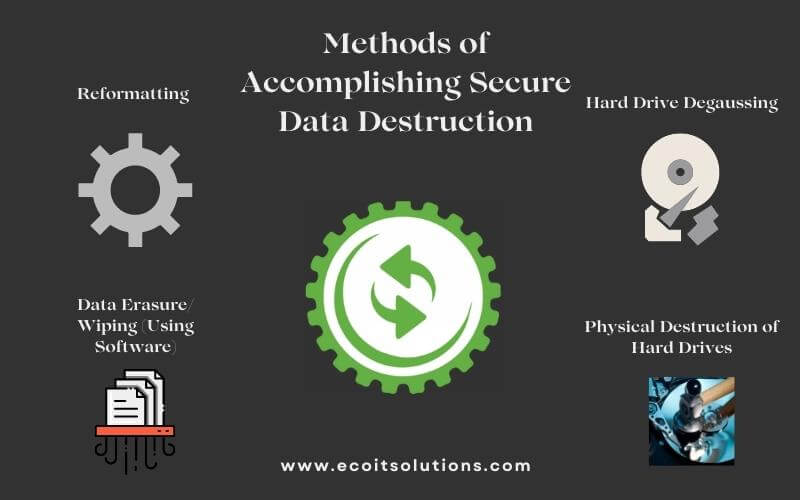Checking Out the Relevance of Data Destruction in the Context of Computer Safety And Security Services and Protecting Confidential Data
In an age where data breaches are increasingly usual, the importance of effective data destruction can not be overemphasized. When no much longer needed, Organizations has to adopt strict measures to make certain that delicate information is not just protected throughout its lifecycle but also emphatically eradicated. The techniques utilized for data obliteration, paired with conformity to lawful criteria, play a critical duty in maintaining confidentiality and count on. The effects of these techniques expand past plain conformity, affecting a firm's credibility and functional integrity in the electronic marketplace. What methods can companies carry out to boost their data destruction procedures?
Comprehending Information Devastation
Data damage is a critical part of computer safety and security that entails the permanent elimination of data from storage gadgets to avoid unapproved gain access to and possible information breaches. In a significantly digital landscape, companies deal with heightened dangers connected with delicate info being incorrectly accessed or manipulated. Efficient data damage safeguards versus these risks, making certain that confidential dataâEUR" such as consumer information, intellectual home, and financial recordsâEUR" can not be recouped after disposal.
Understanding the importance of data damage extends past plain conformity with lawful and governing structures; it is necessary for maintaining organizational stability and trust. When information is incorrectly handled or inadequately ruined, the repercussions can be severe, consisting of financial loss, reputational damages, and lawful liabilities.

Approaches of Information Removal
One widespread approach is information wiping, which entails overwriting existing information with arbitrary patterns multiple times. This strategy renders the original information irretrievable, making it a preferred option for companies seeking to protect private info.
Another technique is degaussing, which makes use of a powerful electromagnetic field to disrupt the magnetic domain names on storage tools, efficiently erasing the data. This strategy is specifically efficient for magnetic media however is not relevant to solid-state drives.
Physical destruction is another robust approach, involving the shredding or crushing of storage devices. This technique assurances that information recovery is basically impossible, making it suitable for very delicate info.
Lastly, encryption can work as a corresponding method to information removal. By securing data prior to deletion, organizations can include an extra layer of security, guaranteeing that even if residues are recovered, they remain unattainable without the decryption trick. Each technique should be chosen based upon the level of data sensitivity and the specific security needs of the organization.
Legal Conformity and Data Safety
Organizations must navigate an intricate landscape of lawful requirements associated with data security, specifically after applying techniques of data obliteration. Various policies, such as the General Information Security Guideline (GDPR) and the Health And Wellness Insurance Portability and Accountability Act (HIPAA), impose strict guidelines on how organizations should dispose and take care of of delicate information. Failure to conform with these regulations can cause considerable lawful consequences, consisting of considerable penalties and reputational damage.
Information destruction procedures must be meticulously recorded to demonstrate compliance with applicable regulations and standards. This documents not just works as evidence of adherence to lawful responsibilities however also illustrates a dedication to safeguarding sensitive info. Organizations ought to likewise establish clear policies relating to information retention and devastation timelines, making certain that information is not held longer than needed.

Furthermore, normal audits and assessments of data devastation techniques are crucial to maintain compliance and adapt to progressing legal frameworks (data destruction). By proactively dealing with legal requirements, companies can minimize dangers linked with information breaches and demonstrate their commitment to information security. Inevitably, prioritizing lawful compliance in information damage processes is not just a governing responsibility, but a basic aspect of a durable data security strategy
Impact on Business Online Reputation
The track record of a company can be dramatically affected by its method to data destruction and monitoring. In today's electronic landscape, where information violations can take place at any kind of minute, the failing to effectively deal with sensitive info can lead to severe effects. Organizations that improperly take care of information devastation risk exposing private consumer details, which not just goes against privacy regulations however likewise erodes depend on among stakeholders and clients.
A damaged online reputation can lead to reduced client commitment, as clients end up being reluctant to engage with a company that has actually demonstrated carelessness in securing their information. In addition, unfavorable publicity bordering an information violation can have a long lasting result, as prospective customers may be discouraged by the perceived absence of security. This can result in a direct decline in earnings and market share.
Moreover, businesses that prioritize information devastation as component of their security method can enhance their track record by showcasing their commitment to guarding sensitive details. By adopting rigorous data management practices, companies can not just minimize risks yet additionally position themselves as trustworthy entities in their respective markets, consequently strengthening their published here overall brand name picture.

Finest Practices for Secure Disposal
Carrying out ideal techniques for safe disposal of data is crucial for mitigating threats related to data breaches and making sure conformity with privacy policies. Organizations should embrace a detailed information disposal plan that describes treatments for both digital and physical information destruction.
For physical data storage space devices, such as hard disks, shredding or degaussing is recommended to avoid data recovery. In addition, companies need to keep a chain of protection documents throughout the disposal procedure, making certain responsibility and traceability of disposed things.
For digital information, making use of software program that sticks to industry requirements for information cleaning is crucial. This software program ought to overwrite existing information numerous times, making healing virtually difficult. It is likewise essential to confirm the efficiency of the data devastation process with audits or third-party assessments.
Educating employees on safe and secure disposal methods adds one more layer of safety and security, as human error can usually bring about data exposure. Regularly assessing and updating disposal plans makes certain alignment with advancing policies and technical improvements. By implementing these finest practices, organizations can considerably reduce the threat of unapproved data gain access to and enhance their overall information security approach.
Verdict
In conclusion, data devastation is a fundamental facet of computer safety solutions that ensures the defense of secret information from unauthorized accessibility. Implementing effective methods of data removal, adhering to legal compliance, and recognizing the useful content effect on service online reputation are crucial parts of a thorough information safety and security strategy. By adopting best methods for safe disposal, organizations can cultivate trust with clients and guard sensitive information, ultimately adding to a more secure digital landscape.
In an age where information breaches are significantly typical, the relevance of reliable information devastation can not be overstated.Information damage is a crucial element of computer safety and security that includes the long-term elimination of information from storage space gadgets to protect against unauthorized access and possible data breaches. Organizations ought to also establish clear policies pertaining to information retention and devastation timelines, making certain that data is not held longer than needed.
By proactively dealing with lawful requirements, organizations can mitigate risks connected with data violations browse around this site and show their dedication to information safety (data destruction). Eventually, focusing on legal compliance in information devastation processes is not simply a regulatory responsibility, but a fundamental aspect of a durable information safety approach